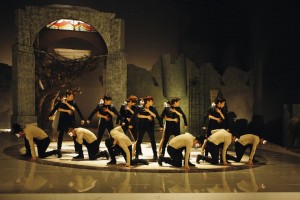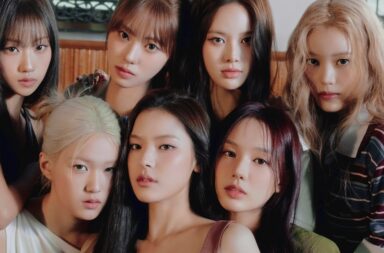 After a four year hiatus, Shinhwa made their comeback with their tenth studio album The Return, furnished with eleven new tracks. The fact that they chose not to come back with merely a “best of” compilation speaks clearly of their view of not being a bygone legend having a special reunion, and that they instead see themselves as still being current and relevant to the modern K-pop industry.
After a four year hiatus, Shinhwa made their comeback with their tenth studio album The Return, furnished with eleven new tracks. The fact that they chose not to come back with merely a “best of” compilation speaks clearly of their view of not being a bygone legend having a special reunion, and that they instead see themselves as still being current and relevant to the modern K-pop industry.
The members have still been involved in different aspects of the industry up until this point, but to make a full-group comeback to their original trade of performing was an unprecedented move.
Shinhwa have taken the harder road of releasing new songs — has it paid off?
1. “On The Road”
The Return starts with what I regard as an Ode To Changjo: the lyrics definitely work with the title of the album, with words that speak of reunification and would probably reduce any Shinhwa fan to a puddle. A lot was made of Shinhwa’s promise to come back after their time in military service, and to hear that promise enunciated in the very first song is definitely an emotional hit to the heart; it thrums with the drums and soars with the strings, and it’s perfect. “On The Road” doesn’t overdo the climax, and thus resists the lure of becoming needlessly epic. Only the rap at the end of the song feels jarring, as singing over rapping isn’t something easily pulled off, and it doesn’t work here, which is a shame because Shinhwa has always been one of the groups that made better use of their rappers than most. Otherwise, a great start to the album.
2. “Hurts”
“Hurts” continues with the sound of “On The Road”, albeit with a more pronounced beat which cuts right through the song, as though to symbolise the hurt piercing through one’s being. Lyrically, if the previous song was for the fans who waited for Shinhwa’s return, then this song could be for the fans that moved on. Of course, both songs can be interpreted in many different ways and could be referring to many things, or nothing at all. Overall, this was a nice continuation aurally from “On The Road,” and I liked the slow rap featured here a lot.
3. “Venus”
Title track “Venus” leads out of ballad territory and into some trendy electro-pop, Shinhwa’s offering to present-day K-pop. However, while it follows current trends and fits into the modern K-pop lexicon, it still retains a uniqueness that makes it stand out, and sets it apart from the rest. Is this, perhaps, the Shinwha sound? The accompanying MV is also something that is not often seen in K-pop, as Gil explains in her MV review. The dubstep break in the end, while subtle, fit the song well and was well executed, like all the other elements.
4. “Red Carpet”
Staying modern, The Return gives us a club-song replete with some lovely Engrish. This song doesn’t suit Shinhwa (even though it was apparently co-produced by Min-woo), and there is a definite lack of energy up until the end of the song, when the final chorus is kicks up a notch. Looking at the previous songs, and even “Venus,” this song is a bit of a let-down, so much that it couldn’t distract me from the tackiness of the lyrics. There were shining moments, but not enough to take it out of “guilty pleasure” territory.
5. “Move With Me”
My disappointment with “Red Carpet” was forgotten the minute I heard that guitar. The wave of ’90s nostalgia that hit me washed away everything, from the bad Engrish in the previous song to the realisation that there was a massive disjoint in sound between songs 4 and 5. The sudden move back two decades should have jolted me, as it probably did a lot of listeners, but I don’t care — I’m too busy grooving away to Shinhwa’s crooning and rapping and just generally indulging my inner ’90s child to care.
6. “Let It Go”
“Move With Me” seems to have been an outlier in the The Return equation, because we are now back to the pianos-plus-modern-beats combination. The sound, along with the lyrics, “Let It Go” seems similar to “Hurts,” but the former does feel lighter than the almost-melodramatic “Hurts.” The lyrical matter is also very similar.
7. “Stay”
And time for some electro-pop again! And make it bubblegum pop — this may well be the cutest Shinhwa gets in this album. This is cuter than “Eusha! Eusha!” and they were actually teens back then. This song sounds more and more ’90s as it progresses. All in all, it’s a cute and fun song, though it does feel a bit sparse, and ends rather abruptly. If it weren’t for the unexpected sound, this could have been forgetful.
8. “Welcome”
The ’90s vibe continues with”Welcome,” which fits in better with the album than “Move With Me.” I absolutely loved how the pre-chorus built up to a climax, and was expecting a drop just before the chorus that never happened. This initially took me by surprise, but the chorus that followed after fit in really well, and I enjoyed that unexpected element. However, I later realized that the verses sounded too much like Wonder Girls’ “So Hot” for my liking. It’s a fun and interesting song, but its production value is not up to par with the rest of the album.
Shinhwa goes retro with “Be My Love,” and it’s a change from the rest of the album, in a nice way. The musicality was receding in the previous few tracks makes a comeback, and manages to be the things that the preceding couple of songs weren’t: fun, cute, and rose-tinted-nostalgic.
10. “Re-Love”
“Re-Love” is slow, with a nice melody. The piano combined with the members’ voices sounds beautiful, and it’s a well executed song. But I do get the feeling of deja vu, where we are going through a loop of ballad-style songs followed by some fast-paced dance-pop.
11. “Breathin'”
What a beautiful song on which to end the album. The singing and rapping blend together especially well in “Breathin’,” as does the melody and beat. Though the song just screams of “hope” to me before even reading the lyrics, the tying in of the act of breathing with persistence, endurance, and yes, hope, is well done. After some of the previous tracks, “Breathin'” is a good enough song to make me forget about the bad, and take away the good as the album draws to a close.
———————
 As stated before, a “best of” compilation would have had the effect of reminding the public of the status of Shinhwa, and all the fame, adoration and accolades it has accumulated thus far. Coming out with completely new material is definitely a sign that Shinhwa wants to be taken seriously as a player in the K-pop field, and not just a special guest who is invited on pitch the first ball, or throw the first hoop.
As stated before, a “best of” compilation would have had the effect of reminding the public of the status of Shinhwa, and all the fame, adoration and accolades it has accumulated thus far. Coming out with completely new material is definitely a sign that Shinhwa wants to be taken seriously as a player in the K-pop field, and not just a special guest who is invited on pitch the first ball, or throw the first hoop.
The Return is a good album, but it does seem that some of the songs are attempting to recall that Shinhwa legend and invoke that nostalgia of the ’90s and early ’00s that is often associated with the band, while other songs are moving with current trends and are decidedly modern. While this may be a clash in itself, the structure of the album doesn’t help matters, with abrupt changes in style occurring throughout the album. While the majority of the songs on the album are great to listen to, the album as a whole lacks total cohesiveness, and this is its biggest flaw.
The Return receives a 3.9 out for 5 from me. What would you give it?




